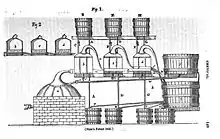| Location | Cork |
|---|---|
| Coordinates | 51°54′42.6″N 8°28′23.5″W / 51.911833°N 8.473194°W |
| Founded | 1796 |
| Founder | Robert Allan and Denis Corcoran |
| Status | Defunct |
| Mothballed | 1870s |
The Green Distillery was an Irish whiskey distillery which was established in Cork City, Ireland in 1796.[1] In 1867, the distillery was purchased by the Cork Distilleries Company (CDC), in an amalgamation of five Cork distilleries.[1] Production of whiskey at the distillery likely ceased soon afters its acquisition by the CDC.[1] However, the distillery is known to have remained in use a bonded store by the Cork Distilleries Company for several years thereafter.[2] In the mid-twentieth century, the distillery resumed operations as a gin distillery for a period of time, however, it has since been almost completely demolished.[1]
The distillery was notable for its use of an early continuous distillation apparatus, invented by the distillery's then co-owner, Joseph Shee.[1]
History
The distillery began life on 12 May 1796, when two distillers, Robert Allan and Denis Corcoran purchased a dwelling house and maltings on North York Street (now Thomas Davis Street) from Bartholomew Foley, a draper.[3] The malthouse had formerly been owned by Thomas Wood, a maltster, in 1780.[3] In 1802, the Allan and Corcoran are recorded as working a 762 gallon still.[3] In the years that followed, the distillery seems to have changed hands several times.[1] Around 1812, the business was being run by two brothers, Thomas and Joseph Shee, Benjamin Hodges, and some others.[3] Thomas Shee acted as the distiller working a 201 gallon still, while Joseph acted a marketing agent based in London.[3] Hodges and the others may have been silent partners who provided capital but nothing else, as their connection with the distillery soon disappeared.[3] Output was recorded at 100,000 gallons in 1828.[1][4] In June 1830, the Shees entered financial difficulties, and ownership passed to Joseph Shee.[3] Joseph continued operations using capital provided by James Kiernan under a mortgage, while Thomas Shee remained on as a distiller.[3] In 1833, excise records show that the distillery paid a duty charge of £26,716, which equated to about 160,000 gallons proof.[3] By 1835, Kiernan took outright control of the distillery.[3] When Kiernan died in December 1844, his will specified that the distillery should be put up for sale.[3] It was purchased on 27 July 1845 by George Waters, who was previously a co-owner of Daly's Distillery on John Street, until the dissolution of the partnership following the death of one of the partners.[5][3]
Waters ran the distillery until his retirement around 1867, after which the distillery was purchased by the Cork Distilleries Company (CDC), in an amalgamation of five Cork distilleries.[1][3] Under CDC, distilling ceased at the distillery in the 1880s, with production transferred to their nearby North Mall distillery.[3] Subsequently, the Green Distillery was used as a bonded store for some time.[2][3] However, in the mid-twentieth century, new equipment was installed in the Green Distillery, with production of gin occurring there for a period of time.[1]
According to Irish Distillers, who absorbed the Cork Distilleries Company in the 1960s, a warehouse on the site was used to store whiskey in bond until the 1980s.[1] Since then, the distillery has been almost completely demolished, with only a small archway remaining. However, one of original pot stills is still in use, currently employed as an experimental still at the nearby New Midleton Distillery.[6]
Notability

The distillery was home to an early continuous distillation apparatus, was which installed and used at the distillery for almost twenty years.[1] The apparatus, which the distiller's co-owner, Joseph Shee, patented in 1834, was similar to Jean‐Édouard Adam's 1801 design, and consisted of a four pot stills connected in series.[7] Though thought to have been effective, the apparatus was not widely adopted.[1] In particular, as a more efficient apparatus, the Coffey Still was patented by another Irish distiller, Aeneas Coffey, in 1830.
See also
Bibliography
- McGuire, Edward B. (1973). Irish Whiskey: A History of Distilling, the Spirit Trade and Excise Controls in Ireland. Dublin: Gill and MacMillan. pp. 376–377. ISBN 0717106047.
- Townsend, Brian (1997–1999). The Lost Distilleries of Ireland. Glasgow: Angels' Share (Neil Wilson Publishing). ISBN 1897784872.
References
- 1 2 3 4 5 6 7 8 9 10 11 12 Townsend, Brian (1997–1999). The Lost Distilleries of Ireland. Glasgow: Neil Wilson Publishing. ISBN 9781897784877.
- 1 2 Cork: Its Trade and Commerce. Cork: Guy & Co. 1919. p. 156.
- 1 2 3 4 5 6 7 8 9 10 11 12 13 14 15 McGuire, Edward B. (1973). Irish Whiskey: A History of Distilling, the Spirit Trade and Excise Controls in Ireland. Dublin: Gill and MacMillan. pp. 376–377. ISBN 0717106047.
- ↑ Accounts and Papers related to Customs & Excise, Imports & Exports, Shipping & Trade. HMSO. 1832.
- ↑ "CORK CITY 1850 - 58: Reports, Notices & the Workhouse". corkgen.org. Retrieved 12 January 2017.
- ↑ O'Connor, Fionnán (2015). A Glass Apart: Irish Single Pot Still Whiskey. Victoria, Australia: Images Publishing. p. 37. ISBN 1864705493.
- ↑ The Repertory of patent inventions and other discoveries and improvements in Arts, Manufactures, and Agriculture. London: W. Simpkin and R. Marshall. 1834.